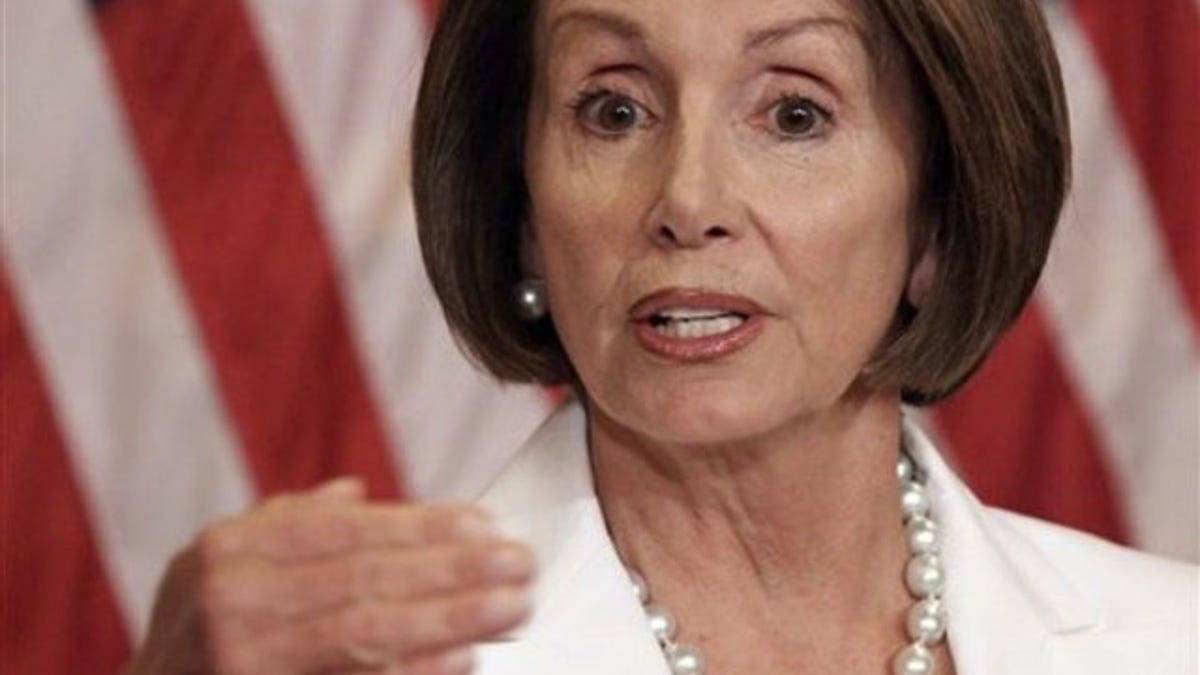
AP
Dear Speaker Pelosi and Mr. Gibbs:
On Oct. 20, Politico published my column in which I explained how the individual mandate in the health care bill is unconstitutional, since there is no constitutional provision authorizing such legislation and it falls outside the scope of the Constitution's Commerce Clause.
Then on Oct. 23, a CNS reporter asked you, Speaker Pelosi, which provision of the Constitution authorized the individual mandate. Your response was, "Are you serious?" You refused to answer the question, and your press secretary later confirmed that you will not answer because you truly think it's "not a serious question."
To answer your question: Yes, Madame Speaker, I am serious. So was that reporter. So are millions of Americans.
Also on Oct. 23, Erwin Chemerinsky, who is not only a top legal scholar but also a liberal lion who believes the Constitution gives Congress vast powers to do all sorts of things, wrote a piece setting forth how a liberal interpretation of Congress' power to regulate interstate commerce could allow the Obamacare mandate.
While I agree that a stridently-liberal interpretation would lead to such a result, I explained in my Oct. 28 Politico follow-up piece why Professor Chemerinsky is likely incorrect as to what the Supreme Court would do. The current Supreme Court is moderate, not liberal (though not conservative, either). I cannot see how the same Court that struck down the Violence Against Women Act (VAWA) in 2000 on Commerce Clause grounds would accept the limitless federal power represented in the individual mandate.
Also on Oct. 28 you, Mr. Gibbs, were asked the same question as the Speaker. You responded that: (1), you are not a constitutional scholar, (2) there are no Supreme Court cases to back up the idea that the mandate is unconstitutional, and (3) the argument that the mandate is unconstitutional is false.
Two out of three isn't bad, Mr. Gibbs. First, you are absolutely correct that no one will mistake you for a constitutional scholar. Second, there are no cases proving that this mandate is unconstitutional.
But that's the problem, because there's also no case suggesting that this mandate is constitutional. There are no cases either way, because this mandate is absolutely without precedent in our nation. This point has been clearly made by the well-respected and nonpartisan Congressional Budget Office and the Congressional Research Service.
And for the reasons I explain elsewhere, this mandate is grossly unconstitutional.
The key here that no one refutes is this: When the Court struck down VAWA in the case U.S. v. Morrison, at least there was an action (a violent act against a woman). And in every case where the Court has upheld a law under the Commerce Clause, it has involved an economic action, even in the 1942 case Wickard v. Filburn that set the outermost limit of Congress' power to regulate interstate commerce.
Here, there is no action. The federal government would penalize -- and perhaps prosecute -- people who are doing nothing at all. Regulating an action is different from coercing an action. If the justices would not allow violent acts against women to be a federal issue, they are not likely to allow people sitting peacefully in their homes to be subject to federal power. It would be a radical expansion of federal law into people's lives.
Also on Oct. 28, The Washington Times carried a piece about how this issue (of whether the individual mandate -- which is the essential provision of your legislation -- is constitutional) has become fodder for a serious debate among legal scholars. They all seem quite serious to me.
With all due respect, what I find most troubling about your response, Madame Speaker, is that it seems as though you reject the idea that the Constitution places any real limits on the power of the federal government. It seems as though you thought it silly for someone to suggest that President Obama and Congress are not empowered to do whatever you want.
Your oath of office, Madame Speaker -- and President Obama's, Mr. Gibbs -- is to support and defend the Constitution. It is not do what you please, or even what you think is right. It is to do only what the Constitution allows you to do.
The concept of limited government was serious to the Founding Fathers. That's why the Constitution is a written document, so that we all know what it allows and what it commands.
Any federal law that violates the Constitution is null and void.
I respectfully recommend for your consideration a bill proposed by Sen. Tom Coburn and Rep. John Shadegg, the Enumerated Powers Act. It would require every piece of federal legislation to specify which constitutional provision authorizes such legislation. The Heritage Foundation published an excellent analysis of how this proposed law would require Congress to answer this question that you deem unworthy of a response.
For the reasons set forth in my Politico columns, the individual mandate is unconstitutional. Should the Democratic-lead Congress pass a bill with this mandate and President Obama sign it into law, a court challenge is probable.
I believe the Supreme Court would strike it down, although you might prevail early on in the lower courts. Should you insist on passing a law penalizing -- or even making it a crime -- for people not to buy insurance, then Congress and President Obama run the risk of a stern judicial rebuke.
If you and President Obama refuse to abide by the limits that the Constitution places on your power, then the Supreme Court may have to do it for you.
Please spare the nation from such an ordeal.
Sincerely,
Kenneth A. Klukowski, Esq.
Ken Klukowski is a fellow and senior legal analyst with the American Civil Rights Union. He is frequent Fox Forum contributor.
